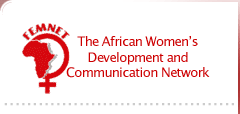FEMNET
Wikis > FEMNET
The African Women’s Development and Communication Network (FEMNET) was set up in 1988 to share experiences,  information and strategies among African women’s non-governmental organisations (NGOs) through advocacy, training and communications so as to advance African women’s development, equality and other human rights.
information and strategies among African women’s non-governmental organisations (NGOs) through advocacy, training and communications so as to advance African women’s development, equality and other human rights.
FEMNET aims to strengthen the role and contribution of African NGOs focusing on women’s development, equality and other human rights. It also aims to provide a channel through which these NGOs can reach one another and share experiences, information and strategies to as to improve their work on African women’s development, equality and other human rights.
Objectives
- exchanging experiences in planning, implementing and evaluating women’s programmes and projects through interaction with NGOs, development agencies and relevant regional and international intergovernmental bodies;
- promoting women’s activities in Africa through the strengthening of existing organisations and the establishment of new ones as may be needed;
- playing vanguard and catalytic roles in the treatment of feminist issues which cannot be handled by government gender mechanisms due to the threat that such issues pose to patriarchal states;
- promoting the better utilisation of African women’s NGOs by development agencies and regional and international intergovernmental organisations (IGOs) such as the African Union (AU) and the various United Nations (UN) agencies;
- mobilising resources for African women’s development, equality and other women’s human rights by local, regional and international sources; and enabling collective action by African women’s movements in order to tackle regional gender issues.
Programmes
- Advocacy Programme: The advocacy programme includes projects designed to evolve approaches and methodologies for dealing with barriers to the implementation of the Dakar and Beijing Platforms for Action (PFAs). FEMNET was the focal organisation for African women’s preparations for participation in the 1995 Beijing Fourth World Conference on Women. FEMNET continues to collaborate with African women’s non governmental organisations (NGOs) on follow-up activities to the Beijing NGO Forum, the parallel intergovernmental conference and the Beijing Plus Five review process. The programme has also been involved in mainstreaming gender into regional processes and institutions, most notably engaging with the African Union and its specialized mechanisms. The advocacy programme has also been involved in promoting the economic, social and cultural rights of African women.
- Communications Programme: Information and Communication technologies provide effective tools for information access and improved networking among women’s organisations. FEMNET’s communications programme seeks to optimumly use ICTs to provide African women with qualitative strategic information on women’s development, equality and human rights and to build the capacity of African women’s organizations to produce content for advocacy.
- Capacity Building Programme: FEMNET has developed a model for training of trainers in gender mainstreaming which is applicable to the 12 priority areas outlined in the African and Beijing Platforms for Action. To better address implementation of the outcomes of the Beijing Plus Five review process, the current training programme targets civil society, governments and intergovernmental representatives involved in gender mainstreaming and/or in communicating this work to wider audiences.The training programme includes seven African countries, in both anglophone and francophone regions–Cameroon, Ghana, Mali, Rwanda, Senegal, South Africa and Uganda. It seeks to update FEMNET’s methodology for gender mainstreaming, develop sector-specific methodologies for gender mainstreaming in the sectors covered by the advocacy programme and to re-build national teams of gender trainers across the region, especially within francophone Africa.
References
- http://www.femnet.or.ke/default.asp


